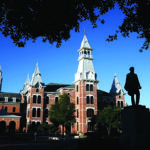WACO—About 250 Baylor University students, faculty and staff gathered on a chilly night outside the home of President Ken Starr for a candlelight vigil supporting survivors of sexual violence.
 Baylor University students and others walk quietly to a prayer service at Truett Theological Seminary for survivors of sexual violence after a candlelight vigil outside the home of President Ken Starr. (Photo / Robert Rogers/Baylor Marketing & CommunicationsThen they moved to a prayer service in the Truett Theological Seminary chapel, where a student described how, a few hours earlier, she reported a sexual assault she said occurred in 2014.
Baylor University students and others walk quietly to a prayer service at Truett Theological Seminary for survivors of sexual violence after a candlelight vigil outside the home of President Ken Starr. (Photo / Robert Rogers/Baylor Marketing & CommunicationsThen they moved to a prayer service in the Truett Theological Seminary chapel, where a student described how, a few hours earlier, she reported a sexual assault she said occurred in 2014.
At the outdoor event in front of Albritton House, the Baylor president’s home, Stefanie Mundhenk—a 2015 Baylor graduate who said another student raped her last March—told the group survivors of sexual violence often feel alone, neglected and unheard.
 Baylor University students, faculty and staff gather for a candlelight vigil supporting survivors of sexual violence. (Photo / Robert Rogers/Baylor Marketing & Communications)“It feels like a family here tonight,” she said. “Family means no one gets left behind or forgotten.”
Baylor University students, faculty and staff gather for a candlelight vigil supporting survivors of sexual violence. (Photo / Robert Rogers/Baylor Marketing & Communications)“It feels like a family here tonight,” she said. “Family means no one gets left behind or forgotten.”
Mundhenk—who grew up in Papua, New Guinea, as the child of missionary parents—posted a blog, “I Was Raped at Baylor and This is My Story,” four days before the vigil and helped organize the event.
“I think Baylor failed a lot of us here tonight,” she said. “But if we didn’t love Baylor, we wouldn’t be here.”
Addressing other students who identified as survivors of sexual violence, she said: “You matter. Your story matters.”
After a time of silent prayer and a poem reading, the assembled group sang, “This Little Light of Mine” before quietly walking to Truett Seminary’s Powell Chapel.
 Geoff Davidson, a graduate of Truett Seminary, preaches a sermon during a prayer service for survivors of sexual violence. “May we hear the cry of our Lord to roll back the stone” and “come forth” into the light, he said. (Photo / Ken Camp)The chapel service—held at the invitation of Todd Still, Truett Seminary dean and Baylor’s interim provost—included several prayers and Scripture readings, along with a brief sermon by Geoff Davidson of Rosebud, a 2012 Truett Seminary graduate.
Geoff Davidson, a graduate of Truett Seminary, preaches a sermon during a prayer service for survivors of sexual violence. “May we hear the cry of our Lord to roll back the stone” and “come forth” into the light, he said. (Photo / Ken Camp)The chapel service—held at the invitation of Todd Still, Truett Seminary dean and Baylor’s interim provost—included several prayers and Scripture readings, along with a brief sermon by Geoff Davidson of Rosebud, a 2012 Truett Seminary graduate.
Sign up for our weekly edition and get all our headlines in your inbox on Thursdays
A survivor’s story
It also included the testimony of a student who agreed to be identified by her first name, Pam.
“I’m a senior set to graduate this May, and I am here to tell you that I reported my sexual assault to Title IX today,” she told the assembly.
Title IX is the law that states, “No person in the United States shall, on the basis of sex, be excluded from participation in, be denied the benefits of, or be subjected to discrimination under any education program or activity receiving federal financial assistance.” Baylor hired a full-time Title IX coordinator in November 2014.
Pam asserted a co-worker assaulted her on-campus at 7 a.m. on a Sunday morning after final exams in May 2014.
“According to a brief calculation, it has been one year and almost nine months,” she said. “That’s 638 days. That’s more than 55 million seconds of hell.
“So, why did I not report it until now? Short story: I was afraid. With our past treatment of assault victims, I believed I had several reasons to be afraid.”
The alleged assault did not fit her “preconceived notion of rape, with a dark alley and a stranger dressed in black,” she said. “My assault was not classically violent, and I didn’t scream. I didn’t go to the hospital and get a rape kit done. I went to my dorm room and took a shower.”
She did not report the alleged assault because she feared nobody would believe her story, Pam said. Furthermore, she asserted, she didn’t want to ruin the life of the student she said assaulted her.
“I like to give people the benefit of the doubt, and I really didn’t want to believe that he intentionally hurt me. So, I just wanted to forget it and move on with my life.”
Dealing with the impact
However, she described months of anxiety attacks, nightmares and depression.
“It feels like the air is right for change. So, I went to Title IX and reported it, even though I am still scared,” she said. “I felt so relieved leaving the office, because I am promised that this is no longer my burden to bear alone.
“I am here to beg Baylor: Please don’t let my case fall through the cracks. Please don’t ignore the victims. Please don’t let anyone else feel afraid and alone at this school. Please let us know how you—as a Christian university—are going to lead the way through this cultural epidemic of assault.”
 Ken StarrThe next day, Starr—who was not present at the events—issued a public statement: “Last evening, our students came together as a family. They displayed great poise and maturity during the vigil at Allbritton House and in the prayer service that followed at our beloved Truett Seminary.
Ken StarrThe next day, Starr—who was not present at the events—issued a public statement: “Last evening, our students came together as a family. They displayed great poise and maturity during the vigil at Allbritton House and in the prayer service that followed at our beloved Truett Seminary.
“We hear your voices loud and clear. You want us to continue to improve. And you want definitive, responsible actions after we receive the insights and recommendations from Pepper Hamilton (the law firm that is conducting an investigation for Baylor). You have my word on both.”
Read the Standard’s ongoing coverage at:
Baylor regents approve plan to address sexual violence
Recent grad says she was raped at Baylor; claims inadequate response
Baylor students plan prayer vigil for victims of sexual violence
Editorial: A trying time—and learning opportunity—for Baylor
Call to action
At the point Starr released the statement, more than 1,500 people had signed “An Open Letter on Responses to Sexual Assault at Baylor University.”
The letter urges Baylor to take several specific actions:
- “Retain the services of qualified investigators who are experienced in handling sexual assault investigations and who will not blame victims, ignore inconsistent respondent claims, or assume that the experience of sexual pleasure constitutes evidence that a survivor was not raped. Baylor must comply with its own policies regarding the irrelevance of a survivor’s sexual history, clothing or past relationships with the alleged perpetrator.”
- “Better implement the interim services for survivors of sexual assault promised in its documented policies, including the right to change course schedules, housing assignments, and work assignments and schedules. The university should prioritize facilitating a survivor’s continuing to participate in on-campus activities with a ‘survivor-first’ attitude when conflicts arise.”
- “Refer student survivors of sexual assault to immediate, adequate counseling resources and security services. Baylor should help facilitate use of these resources and ensure that there are no income barriers to survivors being able to avail themselves of appropriate care. Survivors should also have access to appropriate on-campus security services as needed, including evening escorts.”
- “Implement stronger training programs repeated over the course of a student’s time on campus, including repeated, adequate discussions of affirmative consent standards, what constitutes sexual assault, bystander intervention, and the reporting and treatments options and services available to sexual assault survivors.”
Title IX seeks continued improvement
Patty Crawford, Title IX coordinator at Baylor, noted her office has implemented a comprehensive outreach plan to inform Baylor students about their rights under Title IX and the services available, as well as to train all Baylor employees about their responsibility to report disclosures of sexual violence.
“The first year was about building awareness, and I think we have been very successful at that,” she said.
She applauded the work of the “extremely strong investigators” on her staff, diligent case managers and adjudicators who are trained not only in Title IX law, but also in trauma.
“That being said, I would love more staff,” she noted.
The Title IX office continues to study “best practices” at other universities and make continuous improvements to processes, Crawford noted.
“Every day, we are working on ways we can improve. … We want to continue to hear student voices,” she said.
It is too early to tell if reports of sexual violence at Baylor have increased significantly since the media attention that followed a Feb. 2 “Outside the Lines” report by ESPN about five women who asserted Tevin Elliott, at the time a defensive end on the Baylor football team, sexually assaulted them in incidents from October 2009 to April 2012, Crawford said.
But Crawford insists she welcomes any attention drawn to issues of interpersonal violence among students.
“The more awareness that is raised about this, the better it is for us,” she said. “In our work, increased response is a great thing.”














We seek to connect God’s story and God’s people around the world. To learn more about God’s story, click here.
Send comments and feedback to Eric Black, our editor. For comments to be published, please specify “letter to the editor.” Maximum length for publication is 300 words.